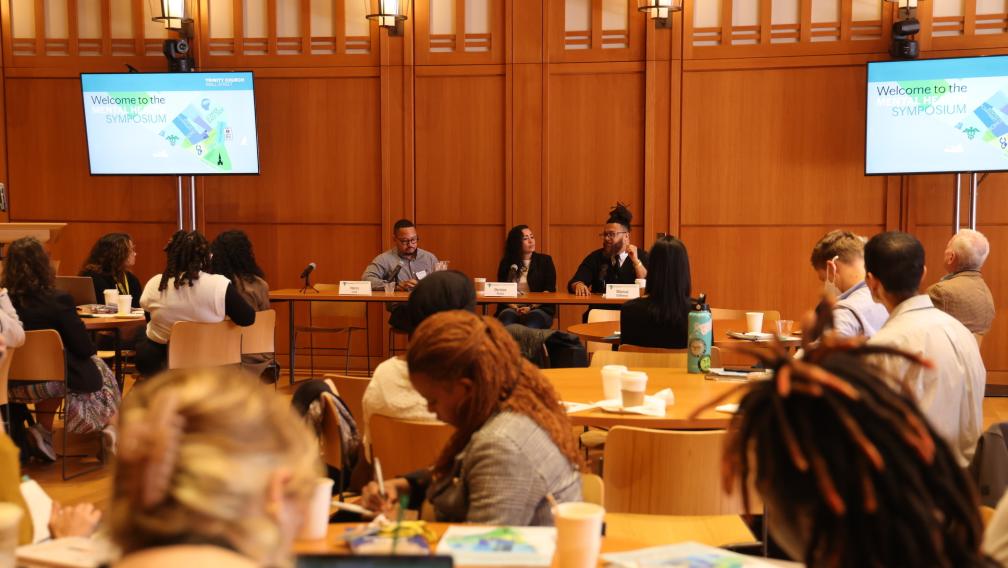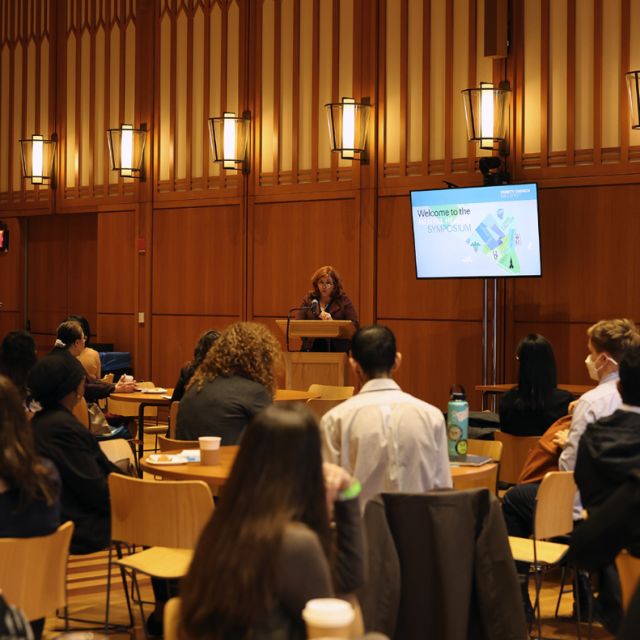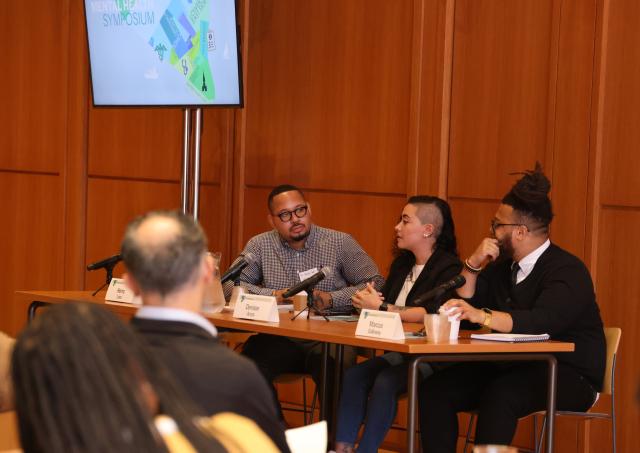In its fourth symposium on mental health and its intersecting challenges, Trinity Church Wall Street explored the interrelationship between poor mental health and housing. Housing insecurity and homelessness are persistent and rising in New York City, with the number of people staying in the city’s Department of Homeless Services (DHS) shelters having risen nearly 40 percent over the past decade.
In 2022, more than 100,000 unique individuals stayed at least one night in a DHS shelter. The average length of stay in DHS shelters was roughly 18 months for adults and families with children.1 These data don’t account for homeless individuals staying in non-DHS shelters, the recent surge in asylum seekers in NYC shelters, or unsheltered homeless people who spend the night in public spaces, including the subway system and parks. Insecure housing, in terms of stability, quality, safety, and affordability, or living in a shelter, is a significant determinant of poor physical and mental health.2 Similarly, poor mental health can also impede access to secure housing, trapping individuals in a vicious cycle of homelessness and poor mental health.3
Reforming the Shelter System is Mental Health Care
Keynote speaker Christine Quinn, President and CEO of WIN NYC—the largest provider of family shelter and supportive housing in the country—highlighted the commonality between homelessness and adverse mental health episodes. Both homelessness and poor mental health are often responses to trauma. Instead of taking a systems approach to prevent or minimize trauma experiences, society often emphasizes personal responsibility and places blame on individuals. Furthermore, people seeking housing or mental health care are often re-traumatized by the systems intended to help them.
For people experiencing persistent and severe mental illness, receiving a diagnosis is a privilege. A lack of awareness of their own condition, stigma around mental illness, substance use as a form of management, and poor access to care can prevent meaningful, ongoing treatment. Psycho-social evaluation is often required for housing support, so the challenges that prevent diagnosis and treatment also impede access to shelter.
Though New York City assures all homeless individuals that they have a right to shelter, that right may not be consistently applied—if a shelter resident is out past curfew, they may be uprooted and placed elsewhere. Furthermore, the experience of staying in a shelter is inherently traumatizing: Loss of autonomy, sleep disturbances, safety concerns, and social stigma around homelessness can worsen depression or mental illness and make transitioning out of shelter more difficult. For those who do transition out of shelter, this shift often represents a loss of their built-in safety net and presents new stressors.
The intertwining of homelessness and poor mental health requires the availability of mental health care providers in shelters, as well as in transitional and supportive housing. As of September 2023, New York City must fund mental health clinicians at all shelters that serve families with children.4 Unfortunately, City-established salary bands for mental health care providers are low, making recruitment and retention of clinical staff difficult.5 Moreover, in early September, Mayor Adams requested that all city agencies draft proposals to trim up to 15 percent of their annual budgets to address looming shortfalls.6
Quinn asserted that these budget changes could stymie the ability of homelessness service providers to support mental health. Trauma-informed homeless services, increased stock of supportive and affordable housing, and aftercare for households transitioning out of shelters are crucial to minimizing the length of stay in homeless shelters and improving mental well-being.
What Can We Do Now?
Our panel speakers and symposium attendees highlighted several ways we can take immediate action to address the dual challenges of housing insecurity and mental health.
First and foremost, advocacy with state and city legislators to uplift evidence-based, trauma-informed practices in mental health care and supportive housing is crucial. Such advocacy needs to center the voices of people most directly impacted. Advocacy can include:
- Media campaigns to encourage a cultural shift away from the stigma surrounding mental illness and homelessness and place pressure on elected officials to stop the politicization of these challenges.
- Economic analysis to demonstrate the long-term gains in establishing an integrated, coordinated system of care in housing, mental health, and other needs that focuses on treatment, not justice involvement.
Service providers can work together to coordinate across agencies, sectors, and funders to ensure people with behavioral health challenges have access to secure housing without significant barriers and to prevent resources (e.g., beds in shelters or units in supportive housing) from going unused.
The mental health workforce pipeline needs significant support that spans initial training to continuing education for later-career professionals.
- Schools that train direct providers must ensure that their graduates are adequately trained to work at the intersection of mental health and homelessness. Such training must also be centered on the lived experiences of clients, be trauma-informed, and be empathic.
- Raise the wage floor for social workers and mental health care providers and consider a wage ceiling to ensure everyone can earn a livable salary.
- Fund and expand non-traditional, community-based mental health support programs, such as peer advocates, to support clients moving through multiple social services and health systems.
Faith-based organizations or other non-profits that do not provide direct service can collaborate in advocacy and messaging about the importance of a coordinated, client-centered approach to address mental health and housing insecurity and combat stigma.
- These organizations can also serve as a convening space for advocates, direct service organizations, and funders to develop a collective action plan.
- Similarly, these organizations can offer mixed “third spaces” that are safe and welcoming for people without housing or with severe and persistent mental illness as well as host trainings on trauma-informed care, peer advocacy, and community building.
1 Coalition for the Homeless. New York City homelessness: The basic facts. February 2023. Available online at https://www.coalitionforthehomeless.org/wp-content/uploads/2023/07/NYC-Homelessness-Fact-Sheet-5-2023_citations.pdf
2 Singh A, Daniel L, Baker E, Bentley R. Housing disadvantage and poor mental health: a systematic review. Am J Prev Med 2019;57(2):262-272.
3 Trinity Church Wall Street. Lower Manhattan needs assessment. May 2, 2022. Available online at https://trinitywallstreet.org/sites/default/files/2022-04/Needs%20assesment_vs10_digital_links_rev.pdf
4 The City of New York. Local Law 35/2023. Accessed online at https://nyc.legistar1.com/nyc/attachments/9aec1e03-efa4-4708-8cc0-a80abc8cb5bd.pdf
5 Breslau J, Barnes-Proby D, Bhandarkar M, Cantor JH, Hanson R, et al. Availability and accessibility of mental health services in New York City, RAND Corporation, RR-A1597-1, 2022. Access online at https://www.rand.org/pubs/research_reports/RRA1597-1.html
6 Meko, Hurubie. Citing Costs of Migrant Care, Adams Calls for More Budget Cuts. New York Times, September 9, 2023. Accessed online at https://www.nytimes.com/2023/09/09/nyregion/nyc-budget-cuts-adams-migrants.html


